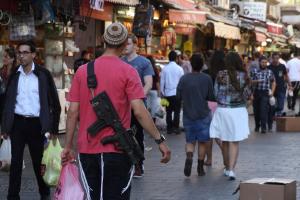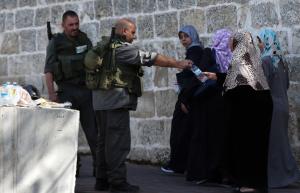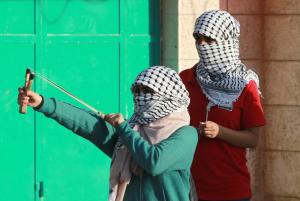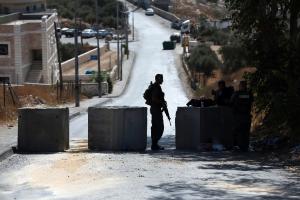Heavily-armed Israeli Soldiers Deployed Massively in Jerusalem
Heavy security, Israelis arm themselves after more knife attacks
October 15, 2015AFP - Israeli security forces deployed massively in Jerusalem Thursday as Jews armed themselves with everything from guns to broomsticks, rattled by a wave of Palestinian attacks that have shaken the country.
"It's time that president Abbas stops not only justifying it, but also calling for it," Netanyahu told reporters.
Some 300 soldiers were reinforcing police, stretched thin by the violence.
They are due to be in place by Sunday, while conscripts wearing fluorescent vests marked "police" could already be seen guarding Tel Aviv's bus station.
At stops along the highway between Jerusalem and the West Bank city of Hebron, a major junction to other points in the occupied territory, border police were boarding and searching every bus.
In addition to the attacks, violent protests have rocked annexed east Jerusalem, the occupied West Bank and the Gaza Strip.
However, Palestinians were calling for a day of protests in the West Bank and Gaza Strip after Friday's main weekly Muslim prayers.
Seven Israelis have been killed and dozens wounded in the violence so far.
In the first two intifadas, in 1987-1993 and 2000-2005, thousands of people were killed and many more hurt in near daily violence.
But other stores are suffering, with shoppers staying home.
"Business is at 15 percent of normal," said Aron Silverberg, who runs a cellphone shop in central Jerusalem's Mahane Yehuda market.
An officer fired a single shot in the air and someone pulled the emergency brake. No suspect was found and no one was hurt.
- Stabbings defy security crackdown -
On Wednesday, police began setting up checkpoints in parts of east Jerusalem, including a neighbourhood home to three Palestinians who carried out gun, knife and car-ramming attacks this week.
The move followed a decision by Netanyahu's security cabinet authorising police to seal off or impose a curfew on parts of Jerusalem.
"Everyone suspects us," he told AFP. "Racism is growing."Netanyahu has come under immense pressure to halt the violence.
The attackers seem to be mostly acting on their own. With no mastermind to pursue, that poses a major challenge to security forces.
While the attacks have fanned Israeli anger and fear, online video footage of security forces shooting dead alleged assailants has fed Palestinian anger, with protesters seeing some of the killings as unjustified.
US Secretary of State John Kerry said Thursday he plans to travel to the region "in the coming days" amid suggestions a meeting could be arranged between Netanyahu and Abbas in Jordan.
Netanyahu firmly rejected suggestions that Jewish settlement building in the West Bank, which has continued under his watch, had led to the current wave of violence.
"This is not a result of a massive wave of settlements because there has not been a massive wave of settlements," he said Thursday night.







No comments:
Post a Comment